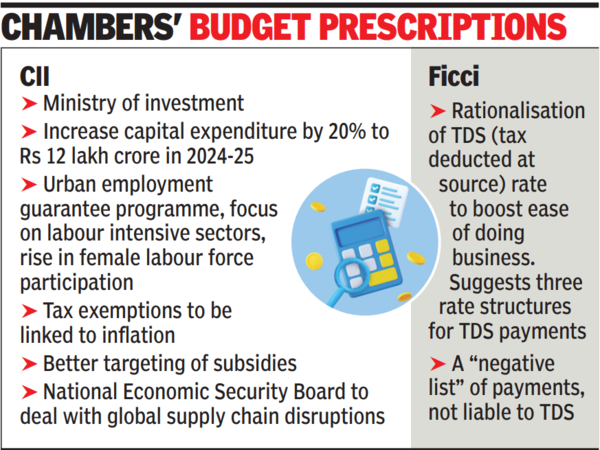FICCI said in its interim budget, “India is at a critical juncture and given the current global developments and related headwinds, the government should continue to place a major emphasis on public capital expenditure (on physical, social and digital infrastructure) in the upcoming budget. Needed.” Recommendations.
CII has suggested this while proposing the Ministry of Investment Capital expenditure This should be increased by at least 20% to Rs 12 lakh crore during the next financial year. It also wants an urban employment guarantee program and a focus on labor intensive sectors like apparel and footwear, besides steps to increase female labor force participation.

Finance Minister Nirmala Sitharaman is scheduled to present the interim budget on February 1, her sixth consecutive budget, which will equal Morarji Desai’s record. While Sitharaman has clearly hinted at a shift to a new tax regime devoid of exemptions and a lower rate, CII wants the exemptions to be linked to inflation, which would result in an increase in the annual limit of Rs 1.5 lakh for savings instruments.
Similarly, FICCI, which has termed the Tax Deducted at Source (TDS) provisions as cumbersome, has recommended rationalizing the TDS rate to enhance ease of doing business. “It has been suggested that there be only three rate structures for TDS payments – TDS on salaries at the slab rate and two standard rates for TDS for different categories. Standard revenue-neutral rates will be evaluated by the Revenue Department based on data and Calculations can be made. Analytics. Additionally, there should be a “negative list” of payments on which TDS will not be charged (e.g. payments to senior citizens, exempt income payments, purchases from GST registered entities on which GST is paid , etc.),” it said.
CII has also called for better targeting of subsidies, such as reducing overall expenditure, something that appears uninteresting ahead of the general elections in April-May. The industry lobby group has also suggested setting up a National Economic Security Board to deal with global supply chain disruptions and reduce dependence on sources that account for the bulk of imports.





